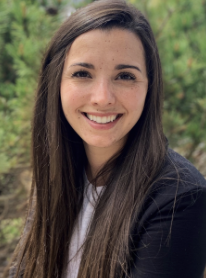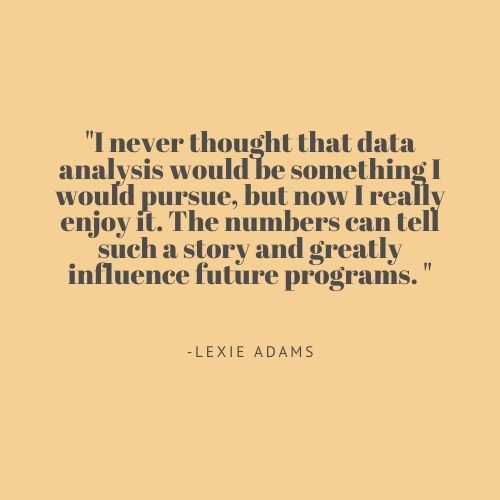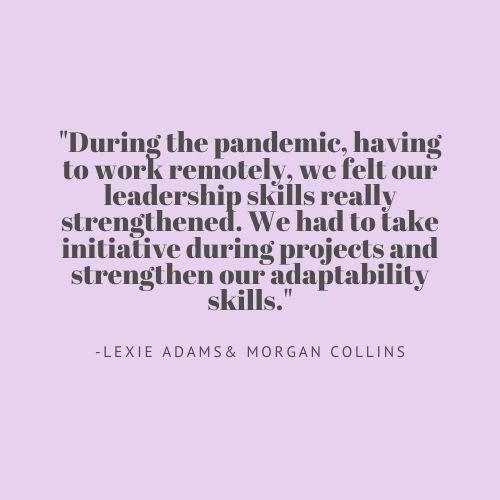Why were you interested in this deployment?

Lexie: I am really interested in child health. This deployment consisted of analyzing and reporting data specific to child and adolescent health in the Twin Cities area. Through this opportunity, I would be able to learn a lot about the children and adolescents in this area, including the health programs currently available to them and the opportunities for different ones to meet their needs.

Morgan: I was specifically interested in the WIC Assessment Intern position because I wanted to gain further experience in evaluating a health service program as well as learn how to conduct a qualitative study and analysis under the direction of Hennepin County community health leaders. I also have a personal connection with WIC as I was on the program as an infant.
What were some of the projects you worked on for Hennepin County?
Lexie: The main project I worked on was analyzing data from the Minnesota Student Survey and creating presentations for different school groups who needed this data. From this data, child and adolescent health indicators were developed and updated. Amy, my supervisor was great to work with; She was always available for questions and made sure I was getting everything I wanted out of the experience.
Morgan: Over the past few years, Hennepin County has seen a decline in WIC enrollment and retention rates. Therefore, the purpose of my internship was to conduct client interviews to help determine potential barriers clients may have encountered during the enrollment and/or appointment process. Under the guidance of my supervisor Amy Leite-Bennett, we created a survey instrument used to conduct one-on-one interviews with clients. I then traveled to three WIC clinic locations located within Hennepin County and conducted interviews myself. After interviews, Amy and I reviewed responses and performed thematic analysis. We then presented our findings to WIC leaders and staff this past April.
How did the current pandemic impact your work?
Lexie: The pandemic allowed me to work on my remote working skills. We were unable to go into the office which unfortunately took away the relationship building aspect of this experience, but I was able to continue my work from home.
Morgan: My project originally would have had two phases, the first interviewing clients and the second, interviewing other WIC locations to learn of methods their county has implemented to help increase WIC enrollment and retention. Unfortunately, we were unable to begin the second phase due to the pandemic, so for the last few months of my deployment, I helped Hennepin County staff with a Community Health Needs Assessment which looked at health disparities among non-Hispanic Black/African American communities residing in Brooklyn Center and Brooklyn Park, MN.
How has being an MCH student helped prepare you for this internship?

Lexie: I started this experience in the fall at the beginning of my MCH program. I believe that starting this deployment and my masters education at the same time shaped what my interests are today. I would have never thought that data analysis would be something I would pursue, but now I really enjoy it. The numbers can tell such a story and greatly influence future programs. Classes offered through the MPH program have allowed me to hone in on these skills that I have newly found.
Morgan: Fortunately, during this experience I was enrolled in an MCH nutrition and evaluation course which really helped prepare me for this internship. I felt that the nutrition course really helped me gain in-depth knowledge of the WIC program which was useful when I was meeting with WIC nutritionists to learn more about the program during my internship. While taking evaluation, I was able to apply what I learned in the classroom to real-world situations. Learning about how to create survey instruments in class helped me tremendously when I was creating one with my supervisor.
During your time at Hennepin Co, what surprised you/what new learnings did you take away from your experiences?
Lexie: I learned how to use SAS programming and gained skills inputting charts and graphs in powerpoint. I was surprised at how much I started to love data analysis, the narrative that data tells is so important in creating and changing programs and opportunities for communities.
Morgan: I learned how to create a survey instrument and dialogue used when interviewing WIC clients as well as learned how to conduct thematic analysis. I also acquired skills in communicating and involving stakeholders. We really needed support from WIC nutritionists when conducting interviews because they were the ones to recruit participants. In order to gain support, we communicated the purpose of interviewing clients, shared what type of questions the survey asked as well as steps we wanted to take after conducting the survey. One thing that surprised me was the total number of participants we needed for thematic analysis. I ended up interviewing 20 WIC clients and we decided to end interviews at this number because my supervisor noticed saturation at the 16th client (saturation is a point in time when you start hearing similar responses), however, we continued interviews because our initial goal was to interview between 20 to 30 participants.
What leadership skills did you grow during your time there?

Prior to the pandemic some leadership skills we gained were project and time management as well as managing meetings with community health leaders. However, during the pandemic, having to work remotely, we felt our leadership skills really strengthened. We had to take initiative during projects and strengthen our adaptability skills. Although we still had direction from our supervisor, we would both need to problem solve on our own initially and then come together to collaborate.
You had the opportunity to work in the biggest county in Minnesota. What was that like for you/what did you learn?
For Lexie, she came from a small town and by working on the student survey for one of her projects, she learned extensively about the demographics of Hennepin county. Also, she learned about programs available in Hennepin County and the disparities to accessing those programs. For Morgan, she was raised near Hennepin County so she was familiar with some of the programs the county offers. However, one thing she took away from her internship experience was how integrative Hennepin County staff were on various projects. For instance, during the WIC project she would work with nutritionists, WIC and community health leaders while evaluating the appointment process. As for both of us, by working for a bigger county, we met new professionals on a regular basis and enjoyed being exposed to the different positions professionals within the county hold.
Lexie is in the MCH Program with a minor in health equity, expecting to graduate in May 2021. Prior to Graduate school, she received her Bachelor’s degree from the University of Wisconsin – La Crosse in Public Health Community Health Education and a minor in nutrition. She is very interested in food insecurity and the effects it has on children. Lexie is looking forward to her second year in the MCH program to add to the knowledge, skills and experiences she has had so far.
Morgan graduated in May 2020 from the MCH Program and is from the Twin Cities area. She graduated in 2012 from the University of Minnesota with a Bachelor’s degree in Elementary Education. Upon graduating, she worked in early childcare for several years, specifically with infants. Through various experiences she became familiar with public health and learned of the MCH Program at the University through an alumna. She is currently working for a healthcare consulting company as an analyst and looks forward to utilizing her knowledge and experience in maternal and child health throughout current and future careers.
–Read Student Spotlight archives
Interested in learning more about getting a degree in MCH? Visit our MCH Program page for more information.
#UMNMCH #UMNproud #UMNdriven